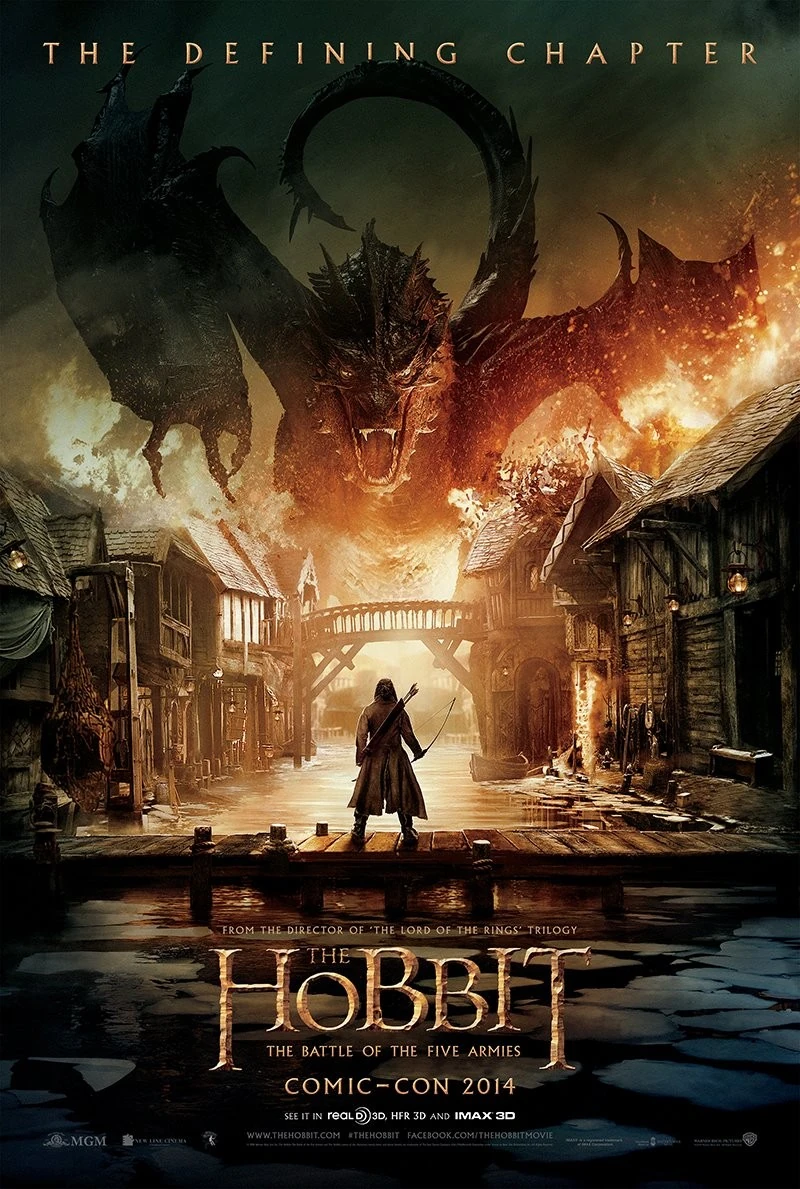 My review of The Hobbit: The Desolation of Smaug
My review of The Hobbit: The Desolation of SmaugThe most frustrating thing about the Hobbit movies is how I can't quite manage to dismiss them completely. Reading my review of the first film is an amusing, if somewhat embarrassingly effusive, flashback to when I was still optimistic about the franchise. My second review had internalized the cynicism to some extent, but was still reluctantly positive. And with the third installment, yet again, I kind of enjoyed the film.
[Spoilers]
Throughout the two and a half hour run-length of The Battle of the Five Armies, I was fighting to hate it. Part of the problem is that Peter Jackson still shows flashes of his old genius, though marred by his utter lack of restraint. The film begins with the quick, dramatic dispatching of Smaug the dragon by Bard and Bard Jr. (really Bain). This act is accomplished using a cobbled-together bow to launch a giant arrow off of Bain's shoulder. The shoulder thing was a neat idea, a great element of added personal tension, but to convince us that a makeshift bow would launch a huge arrow off a little boy's shoulder...uh, no.
Following the destruction of Laketown, another chunk of story goes into building the various interests which will result in the battle of...y'know, four armies, because the wolves don't turn up. Thranduil is steadfastly uninteresting, though a back-story involving the death of his wife battles valiantly against his natural non-charisma.
Thorin, played by an unusually extreme Richard Armitage, has been completely corrupted by greed. An issue with this story-line is that there is no build-up - at the end of the last film, we saw some foreshadowing, but at the beginning of TBOTFA he's gone full Scrooge. Still, while staged a bit clumsily, Thorin's descent into darkness adds some nice menace to the story, and forces Bilbo to become independent. The other dwarves are almost nonexistent, except for Kili - he of the terrible love triangle (the climax of that storyline, right before Thranduil made some sort of dumb comment about love, reminded me strongly of this.)
Somehow, Martin Freeman is unimpressive. Maybe it's just that I've recently finished watching him in the 10-episode miniseries Fargo, but he's becoming predictable. Throughout the trilogy Bilbo lost his eccentric middle-aged British gentleman persona which separated him from the other, more modern characters Freeman is known for playing. His confidence is such that he doesn't really seem to believe himself to be a "quite a little fellow in a wide world," (one notes that he doesn't respond with a "thank goodness!" when Gandalf makes this comment, but more on that later), and this lack of humility is unappealing.

 |
| Striking imagery, but WHAT WERE THEY THINKING? |
All of that said, I can't really muster up an active dislike, because, like the other two installments, I really enjoyed watching it. Merely as a sensory experience, the film is extraordinary, and the pacing is good enough (better than the other two) that it doesn't become bogged down in battle scenes. There are several actors fighting bad dialogue to give good performances (my heart bleeds for Evangeline Lilly). The lack of stupid humor, the lack of Radagast, a few really good moments (that golden floor, the Thorin-Bilbo-acorn conversation) result in what may be the best film of the trilogy. When the inevitable fan-edit comes along, it may be worth seeing. Advice: have Azog drown. Because that would be very coolly anticlimactic-in-a-good-way.
Lastly, it's Tolkiens's birthday. If this prequel trilogy does any good at all, it will be to send people to his work. Let's hope it does. These are, after all, only three films in a very wide world. Thank goodness!
3 stars
Hannah Long


Wait, I'm confused. I thought Lewis was the professor. Has Tolkien been the professor all this time? Or are you being visited by two spirits?
ReplyDeleteAh, yes. This is confusing. Lewis is, indeed, the Professor Professor. Tolkien was just *a* professor. Should probably clarify this.
Delete